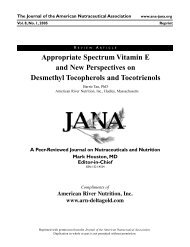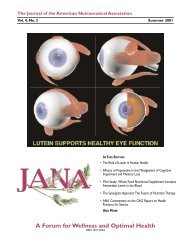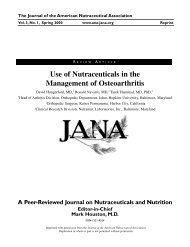JANA Vol 9 #1 - American Nutraceutical Association
JANA Vol 9 #1 - American Nutraceutical Association
JANA Vol 9 #1 - American Nutraceutical Association
You also want an ePaper? Increase the reach of your titles
YUMPU automatically turns print PDFs into web optimized ePapers that Google loves.
The initiative was one of the first studies to use scientific<br />
measurements to demonstrate that therapeutic dogs<br />
lower anxiety, stress, and heart and lung pressure among<br />
heart failure patients. “The study demonstrates that even a<br />
short-term exposure to dogs has a beneficial physiological<br />
and psychological effect on patients who want it,” Cole said.<br />
“This therapy warrants serious consideration as an adjunct<br />
to medical therapy in hospitalized heart failure patients.<br />
Dogs are a great comfort. They make people happier,<br />
calmer, and feel more loved. This is huge when patients are<br />
scared and not feeling well.”<br />
Other studies and findings add to the mounting volume<br />
of scientific research that points to the benefits of animal<br />
therapy:<br />
• In 2002, the Journal of the <strong>American</strong> Medical <strong>Association</strong><br />
reported that children exposed to pets during the first year of<br />
life have a lower frequency of allergic rhinitis and asthma.<br />
• In her article “Children’s Adjustment to the Death of a<br />
Parent,” published in the Journal of Youth and<br />
Adolescence, Victoria H. Raveis noted that the companionship<br />
of pets (particularly dogs) helps children adjust<br />
better to the serious illness or death of a parent.<br />
• In 2002, a study of autistic children by Rehabilitation<br />
Services of Roanoke, Virginia, revealed that animal-assisted<br />
therapy is more effective than conventional therapy.<br />
These findings and the results of the UCLA study are<br />
in line with what many healthcare professionals across the<br />
country are observing in their own practices.<br />
Patti Wilson works in a world where fear, sorrow, and<br />
pain are everyday occurrences. A nurse practitioner in the<br />
Department of Radiology of the Cancer Center at the<br />
University of Alabama at Birmingham (UAB) Hospital, she<br />
reports for duty each day in an environment beyond comprehension<br />
for most of us. She regularly witnesses the emotional<br />
trauma of patients and families battling cancer, the<br />
number two cause of death in the United States.<br />
In addition, Wilson’s work puts her in a position to<br />
observe the remarkable therapeutic benefits these people<br />
receive from specially trained animals and their handlers.<br />
“I have seen eyes dulled by fear and pain become bright<br />
with joy when these sweet animals sit patiently and look<br />
back with bright, loving eyes, and when the human component<br />
of the team takes the time to show they care,” Wilson<br />
states. “I’ve seen the hands of patients, family members and<br />
staff reach out to pet these precious animals and have seen<br />
the smiles, . . . smiles that replace the frowns of those who<br />
are very ill and anxious.”<br />
But smiles are not the only benefits, as Wilson notes<br />
and the UCLA study points out. “Physiologically, the benefits<br />
include a decrease in hypertension and in cortisol<br />
steroids, the hormones responsible for the harmful effects<br />
of stress,” Wilson continues. “Psychologically, it has been<br />
8<br />
HIP volunteers and their therapy dogs working<br />
with young patients undergoing treatment at UAB’s<br />
Comprehensive Cancer Center in Birmingham.<br />
documented to reduce feelings of depression and increase<br />
feelings of well being and confidence.”<br />
Wilson’s findings are echoed by others.<br />
“You could literally watch her blood pressure lowering<br />
on all the monitors while Drumm, the therapy dog, was<br />
there visiting,” reports Jenni Boswell, a pet therapy volunteer<br />
after a visit to the Cardiac Unit of University Hospital<br />
in Birmingham, Alabama.<br />
A desire to bring this documented and remarkable<br />
healing power of pets to those in need led one Birmingham<br />
woman to establish a local organization that has since been<br />
spotlighted on national and international stages.<br />
Born into an Air Force family, Alabama native Beth<br />
Franklin called many places home while she was growing<br />
up. Her professional life with Blue Cross Blue Shield of<br />
Alabama spanned 21 years before she decided to put her<br />
Master’s degree in counseling to work in other areas. A<br />
lifelong love of pets led her to a volunteer position with the<br />
Birmingham Humane Society, where she eventually<br />
became its director. While participating in a program that<br />
<strong>JANA</strong> <strong>Vol</strong>. 9, No. 1, 2006









